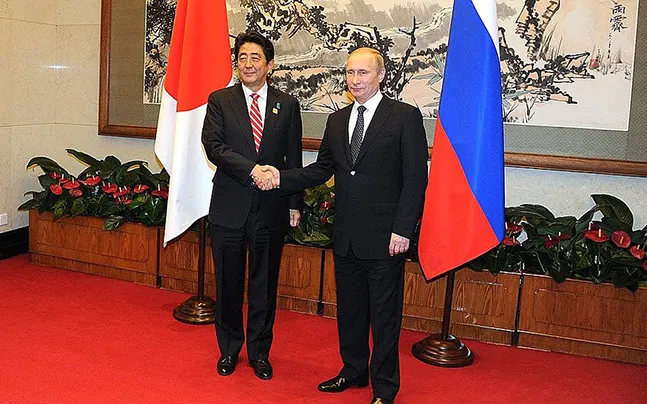
The long-awaited summit between Japanese Prime Minister Shinzo Abe and Russian President Vladimir Putin on 15 December has failed to deliver the desired outcomes on crucial issues. The summit commenced on an unpleasant note with Putin arriving almost three hours late. This was to be a prelude to a summit that saw no progress on Japan-Russia Peace Treaty or resolving the Kuril Islands dispute, one of the main irritants in the bilateral relations.
The Russian posture of 'hard sovereignty', arguably, may be the primary reason why President Putin was reluctant to discuss the territorial dispute issue. This attitude may have been fortified by the election of Donald Trump as the President of the United States. Putin imagines a Trump White House to be much friendlier than the previous administrations. Given this expectation, he can afford to be obstinate.
The islands dispute prevailing in the Sea of Okhotsk is the main issue hindering progress in the Japan-Russia bilateral relations. The Kuril island chain stretches from Japan's Hokkaido to Russia's Kamchatka peninsula, and four of these islands are regarded as disputed territory. Russia had occupied these islands following the end of the Second World War. However, Japan still considers them as their own territory. This protracted disagreement has prevented the two countries from signing a Peace Treaty to formally end the hostilities. Russia controls the four islands, marked by the presence of Russian citizens and even anti-ship missile systems.
Frequent meetings this year between the leaders and officials of the two countries had led to increased expectations, especially in Japan. But signs of disinclination had been visible on the Russian side even before the commencement of the summit. President Putin had sparked controversy two days before the summit by refusing to acknowledge the existence of any territorial dispute between the two countries. Similar statements had been made earlier by Valentina Matviyenko, Head of Russia's Upper Chamber of Parliament. She had claimed that Russia's sovereignty over the islands is certified by a certain international document and Russia cannot just give up that sovereignty. Talks during the summit again witnessed President Putin emphasising the legitimacy of Russian control of the islands. Prime Minister Abe thus had no choice but to limit his expectations from the summit on this front.
The reason behind Putin's unyielding approach to Japan's offer of greater cooperation lies in his prevalent position of strongly defending Russian sovereignty. The Crimean episode is a case in point. A military intervention by Russia in 2014 had led to the return of Crimea to the Russian Federation. Putin holds that a precondition to Russia's return to greatness, is retaining and not letting go of Russian territory.
Putin's posture of protecting territorial sovereignty has been reinforced by the election of Donald Trump to the White House. The Russian President has always been influenced by purely realist calculations while playing the geopolitical game. His initial strategy -- being unsure of who would occupy the White House come January 2016 -- was to engage with Japan to mitigate the international isolation resulting from its actions in Crimea. But following the striking results of the 8 November US election, amicable relations with President-elect Trump puts Russia in an advantageous position where it can choose not to engage with Japan in any substantial way. Throughout his campaign, Trump had suggested close cooperation with Russia in fighting the threat from the Islamic State. There have even been claims by the Obama administration of Russian involvement in skewing the US Presidential elections in favour of Donald Trump. Trump's Secretary of State nominee, Rex Tillerson, the ExxonMobil Corp. Chief, is also seen as being friendly to Moscow.
As far as economic cooperation is concerned, it appears that President Putin has sacrificed nothing in return of Japanese assistance. Quite a few economic deals had been signed during the summit in areas of nuclear energy, oil and gas, logistics, chemicals and investment. But these agreements are mostly non-binding Memorandums of Understanding. For countries like Russia, sovereign control of territory to which it has historical claims override any potential gains from economic cooperation that would follow from relinquishing the same. It is quite likely that Putin was cognizant of the possibility of sanctions should he annexe Crimea.
Disappointment regarding the lack of tangible progress in the summit is quite visible among the Japanese. Not many members -- even within the ruling party -- have praised the outcome of the talks. Toshihiro Nikai, the secretary-general of the ruling Liberal Democratic Party, has expressed outright displeasure over the results of the meeting between the two leaders. He has said that PM Abe "needs to keep in mind that most Japanese people are disappointed."
The geopolitical situation is not playing out in favour of Japan at the moment. Chinese belligerence, possible estrangement with the US under Trump administration, and now the Russian reluctance to resolve longstanding disputes - all of these are compounding to pose significant problems for Japan.
Build up to the Abe-Putin summit can be found here:
Will Abe be able to forge a new partnership with Putin?
(The author is a research intern at ORF Delhi)
The views expressed above belong to the author(s). ORF research and analyses now available on Telegram! Click here to access our curated content — blogs, longforms and interviews.




 PREV
PREV

